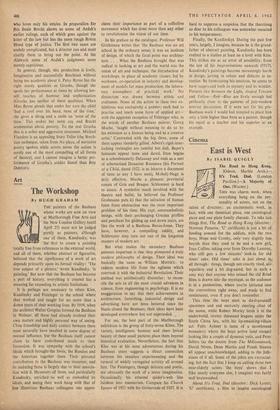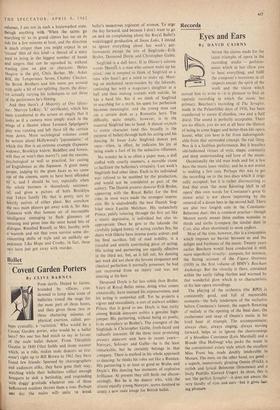Cinema
East is West
By ISABEL QUIGLY The Road to Hong Kong. (Odeon, Marble Arch.)— It's Trad, Dad. (London Pavilion.)—A Majority of One. (Warner.) THIS was charm week, when everything hung on the per- sonality of actors, not on the talent of directors: an uncinematic week, in fact, with one theatrical piece, one sociological piece and one plain family charade. To take last things first, The Road to Hong Kong (director: Norman Panama; 'U' certificate) is just a bit of hoofing around for the addicts, with the two boys, Hope and Crosby, only very slightly less boyish than they used to be and a new girl, Joan Collins, taking over from Dorothy Lamour, who still gets a few minutes' look-in for old times' sake. Old times' sake is just about it, all through : things, though not exactly tired, are repetitive and a bit dog-eared, but in such a cosy way that anyone who missed the old Road films is drawn into the mystique, as the audience is in a pantomime, where you're initiated into the conventions right away, and made to feel reminiscent, even if you don't remember.
This time the boys start as do-it-yourself spacemen and end narrowly steering clear of the moon, while Robert Morley lords it in the underworld, twenty thousand leagues under the South China Sea, with his lip-smacking-villain act. Felix Aylmer is lama of a snowbound monastery where the boys arrive (and escape) looking like a couple of dynamic yetis, and Peter Sellers (as the doctor from The Millionairess), David Niven, Dean Martin and Frank Sinatra all appear unacknowledged, adding to the folk- siness of it all. Some of the jokes are excruciat- ing, but the fact that I keep on calling those two near-elderly actors 'the boys' shows that I (like nearly everyone else, I imagine) was fairly well brainwashed.
About It's Trad, Dad (director: Dick. Lester; 'U' certificate), a film to inspire sociological volumes, I am not in such a brainwashed state, though anything with 'When the saints go marching in' as its grand climax has me on its side for a few minutes at least, and the direction Is much crisper than you might expect in an 'excuse' film of this kind—a thread of a story used to bring in the biggest number of bands and singers that can be squashed in, without *Fisting time on plot or character. Helen Shapiro is the girl, Chris Barber, Mr. Acker Bilk, the Temperance Seven, Chubby Checker, the Brook Brothers and lots more are around with quite a bit of ear-splitting :Alarm, the direc- tor actually varying his techniques to suit those of the performers he's filming, And then there's A Majority of One (direc- tor: Mervyn LeRoy; 'U' certificate), which has been transferred to the screen so stagily that it looks as if a camera were simply stuck in the wings of a theatre where Leonard Spigelgass's play was running and left there till the curtain went down. More sociological volumes could be written about Hollywood's 'japonaiserie,' of which this film is at extreme example (Japanese widower, Brooklyn widow, Buddhist and Jewess, will they or won't they marry?), and the reasons, psychological as well as practical, for casting an Englishman as the Japanese. A great many People, judging by the glum faces as we came out of the cinema, seem to have been offended by it, and I should be too, especially when the whole business is shamelessly sentimen- tal, and gives a picture of both Brooklyn and Tokyo family life that is pretty sure to horrify natives of either place. But somehow the two main players get away with it, Sir Alec Guinness with that famous air of inscrutable intelligence managing to flash glimmers of meaning and point into the most banal bits of dialogue, Rosalind Russell, as Mrs. Jacoby, with a warmth and wit that even survive some dis- concerting shifts of style and an unlikely ap- pearance. Like Hope and Crosby, in fact, these two have just got away with murder.



































 Previous page
Previous page